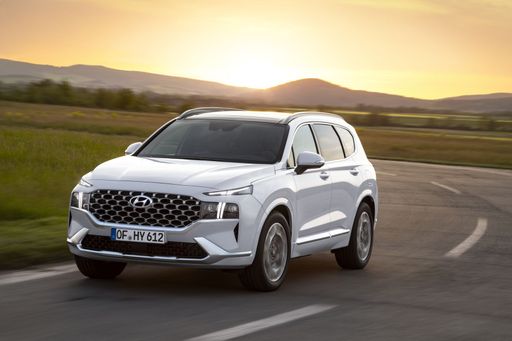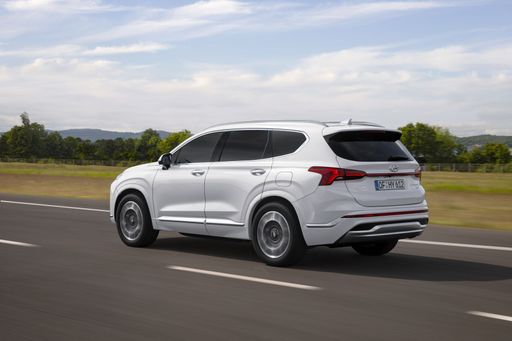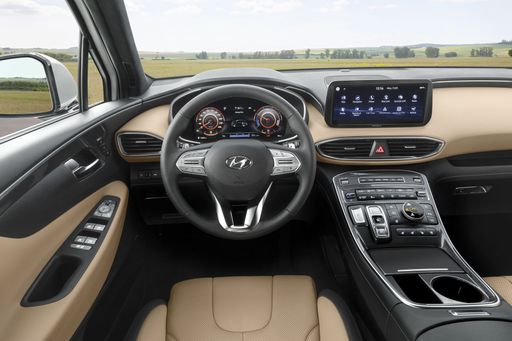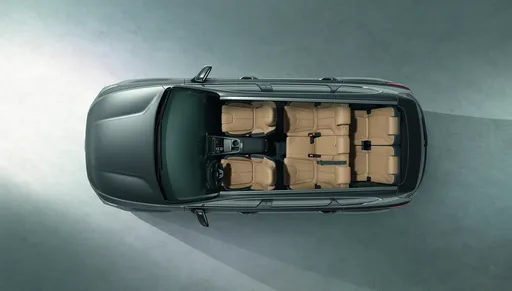Hyundai Santa Fe vs Toyota C-HR – Which one offers the better deal?
Both models have their strengths – but which one suits you more?
Compare performance, efficiency, price and space directly: Hyundai Santa Fe or Toyota C-HR?
Costs and Efficiency:
Price and efficiency are often the first things buyers look at. Here it becomes clear which model has the long-term edge – whether at the pump, the plug, or in purchase price.
Toyota C-HR has a clearly advantage in terms of price – it starts at 29100 £, while the Hyundai Santa Fe costs 51200 £. That’s a price difference of around 22080 £.
Fuel consumption also shows a difference: Toyota C-HR manages with 0.80 L and is therefore convincingly more efficient than the Hyundai Santa Fe with 1.70 L. The difference is about 0.90 L per 100 km.
As for range, the Toyota C-HR performs noticeable better – achieving up to 68 km, about 14 km more than the Hyundai Santa Fe.
Engine and Performance:
Power, torque and acceleration say a lot about how a car feels on the road. This is where you see which model delivers more driving dynamics.
When it comes to engine power, the Hyundai Santa Fe has a to a small extent edge – offering 253 HP compared to 223 HP. That’s roughly 30 HP more horsepower.
In acceleration from 0 to 100 km/h, the Toyota C-HR is clearly perceptible quicker – completing the sprint in 7.40 s, while the Hyundai Santa Fe takes 9 s. That’s about 1.60 s faster.
In terms of top speed, the Hyundai Santa Fe performs slight better – reaching 196 km/h, while the Toyota C-HR tops out at 180 km/h. The difference is around 16 km/h.
Space and Everyday Use:
Whether family car or daily driver – which one offers more room, flexibility and comfort?
Seats: Hyundai Santa Fe offers evident more seating capacity – 7 vs 5.
In curb weight, Toyota C-HR is clearly perceptible lighter – 1505 kg compared to 1920 kg. The difference is around 415 kg.
In terms of boot space, the Hyundai Santa Fe offers noticeable more room – 711 L compared to 447 L. That’s a difference of about 264 L.
In maximum load capacity, the Hyundai Santa Fe performs convincingly better – up to 2032 L, which is about 877 L more than the Toyota C-HR.
When it comes to payload, Hyundai Santa Fe distinct takes the win – 665 kg compared to 425 kg. That’s a difference of about 240 kg.
Who comes out on top?
Overall, the Toyota C-HR shows itself to be wins the duel decisively and secures the title of DriveDuel Champion.
It convinces with the more balanced overall package and proves to be the more versatile choice for everyday use.
 @ Toyota Motor Corporation
@ Toyota Motor Corporation
Toyota C-HR
Hyundai Santa Fe
The Hyundai Santa Fe blends practical family friendliness with a hint of premium style, offering roomy, sensible packaging wrapped in modern, confident design. Inside it serves up comfortable seats, straightforward tech and a calm, composed ride that makes daily drives feel a little more grown up — a solid all‑rounder that doesn’t try to be flashy.
details @ Hyundai Motor Company
@ Hyundai Motor Company
 @ Hyundai Motor Company
@ Hyundai Motor Company
 @ Hyundai Motor Company
@ Hyundai Motor Company
 @ Hyundai Motor Company
@ Hyundai Motor Company
 @ Hyundai Motor Company
@ Hyundai Motor Company
Toyota C-HR
The Toyota C-HR cuts a striking figure with its angular styling and coupe-like profile, so you’ll never go unnoticed in the supermarket car park. It balances everyday practicality with a nimble, city-friendly personality, making routine commutes feel a touch more fun without asking for forgiveness.
details @ Toyota Motor Corporation
@ Toyota Motor Corporation
 @ Toyota Motor Corporation
@ Toyota Motor Corporation
 @ Toyota Motor Corporation
@ Toyota Motor Corporation
 @ Toyota Motor Corporation
@ Toyota Motor Corporation
 @ Toyota Motor Corporation
@ Toyota Motor Corporation
 @ Hyundai Motor Company
@ Hyundai Motor Company
|
 @ Toyota Motor Corporation
@ Toyota Motor Corporation
|
|
|
|
Costs and Consumption |
|
|---|---|
|
Price
51200 - 58400 £
|
Price
29100 - 42800 £
|
|
Consumption L/100km
1.7 - 7.1 L
|
Consumption L/100km
0.8 - 5.1 L
|
|
Consumption kWh/100km
-
|
Consumption kWh/100km
-
|
|
Electric Range
54 km
|
Electric Range
68 km
|
|
Battery Capacity
-
|
Battery Capacity
-
|
|
co2
38 - 160 g/km
|
co2
17 - 115 g/km
|
|
Fuel tank capacity
47 - 67 L
|
Fuel tank capacity
43 L
|
Dimensions and Body |
|
|---|---|
|
Body Type
SUV
|
Body Type
SUV
|
|
Seats
5 - 7
|
Seats
5
|
|
Doors
5
|
Doors
5
|
|
Curb weight
1920 - 2165 kg
|
Curb weight
1505 - 1755 kg
|
|
Trunk capacity
621 - 711 L
|
Trunk capacity
350 - 447 L
|
|
Length
4830 mm
|
Length
4362 mm
|
|
Width
1900 mm
|
Width
1832 mm
|
|
Height
1720 mm
|
Height
1558 - 1564 mm
|
|
Max trunk capacity
1942 - 2032 L
|
Max trunk capacity
1076 - 1155 L
|
|
Payload
560 - 665 kg
|
Payload
375 - 425 kg
|
Engine and Performance |
|
|---|---|
|
Engine Type
Plugin Hybrid, Full Hybrid
|
Engine Type
Full Hybrid, Plugin Hybrid
|
|
Transmission
Automatic
|
Transmission
Automatic
|
|
Transmission Detail
Automatic Gearbox
|
Transmission Detail
CVT
|
|
Drive Type
All-Wheel Drive, Front-Wheel Drive
|
Drive Type
Front-Wheel Drive, All-Wheel Drive
|
|
Power HP
239 - 253 HP
|
Power HP
140 - 223 HP
|
|
Acceleration 0-100km/h
9 - 9.3 s
|
Acceleration 0-100km/h
7.4 - 9.9 s
|
|
Max Speed
180 - 196 km/h
|
Max Speed
175 - 180 km/h
|
|
Torque
367 - 380 Nm
|
Torque
-
|
|
Number of Cylinders
4
|
Number of Cylinders
4
|
|
Power kW
176 - 186 kW
|
Power kW
103 - 164 kW
|
|
Engine capacity
1598 cm3
|
Engine capacity
1798 - 1987 cm3
|
General |
|
|---|---|
|
Model Year
2024 - 2025
|
Model Year
2024 - 2025
|
|
CO2 Efficiency Class
B, E, F
|
CO2 Efficiency Class
C, B
|
|
Brand
Hyundai
|
Brand
Toyota
|
What drivetrain options does the Hyundai Santa Fe have?
Available configurations include All-Wheel Drive or Front-Wheel Drive.
The prices and data displayed are estimates based on German list prices and may vary by country. This information is not legally binding.
